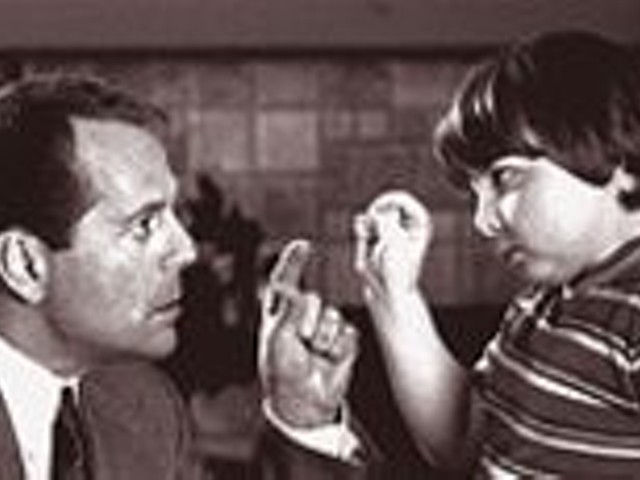Mitani adapted the play he co-wrote with the Tokyo Sunshine Boys, an alternative theatrical troupe, and wisely resisted the temptation to open up the play. He knew the dynamic energy would too easily dissipate if he abandoned the confining recording studio, a volatile environment precisely because of its physical and emotional constraints. To keep momentum, Mitani choreographs his camerawork as gracefully as his unfolding narrative. Thanks to this technical finesse, Mr. McDonald avoids any enervating claustrophobia, though we never see daylight or an expansive exterior. Cinematographer Kenji Takama anticipates and reinforces characters' emotions by gliding into closeups as tension builds or drifting to distance shots as individuals regroup. Energizing the simplest events, compositions include multiple planes of characters, all registering impeccably modulated reactions.
Several humorous cameos reward devoted Japanese film fans. Ken Watanabe, from the enormously popular Juzo Itami comedy Tampopo, appears in interspersed shots as an avid radio listener, cocking his cowboy hat as he steers his semi trailer. His animated involvement with the radio drama culminates in a satisfying, humorous payoff. Hiromasa Taguchi of Shall We Dance? and Nobuko Miyamoto, Itami's widow and star of his A Taxing Woman and A Taxing Woman's Return, also contribute charming moments to the entertaining antics.
Mitani, who worked as a scriptwriter on Itami's final film, clearly has a flair for lively dialogue and shares Itami's ability to combine verbal and physical humor while walking the fine line between affectionate caricature and social satire. The exchanges (for which he won the 1997 Kinema Junpo Nippon Best Script Award) ignite collisions without forced, "writerly" contrivances. And some of the film's best laughs come from the veteran sound-effects man, recruited from his security job to help out when the prerecorded-effects room is locked, the key lost.
Mitani's sustained, assured debut proves again that a comedy can be both universally appealing and culturally specific, especially to the deferential hierarchy of Japanese society. There are few jokes we don't "get," so carefully defined are the characters and so perfectly are their foibles embodied by this superb acting ensemble. The finely drawn Mr. McDonald accomplishes what the best comedies achieve -- it perches on the edge of a precipice and delights in the hilarious disaster that ensues.
In Japanese with English subtitles.
Plays at 9 p.m. July 6, 8:30 p.m. July 7 and 8 p.m. July 8 at Webster University.





